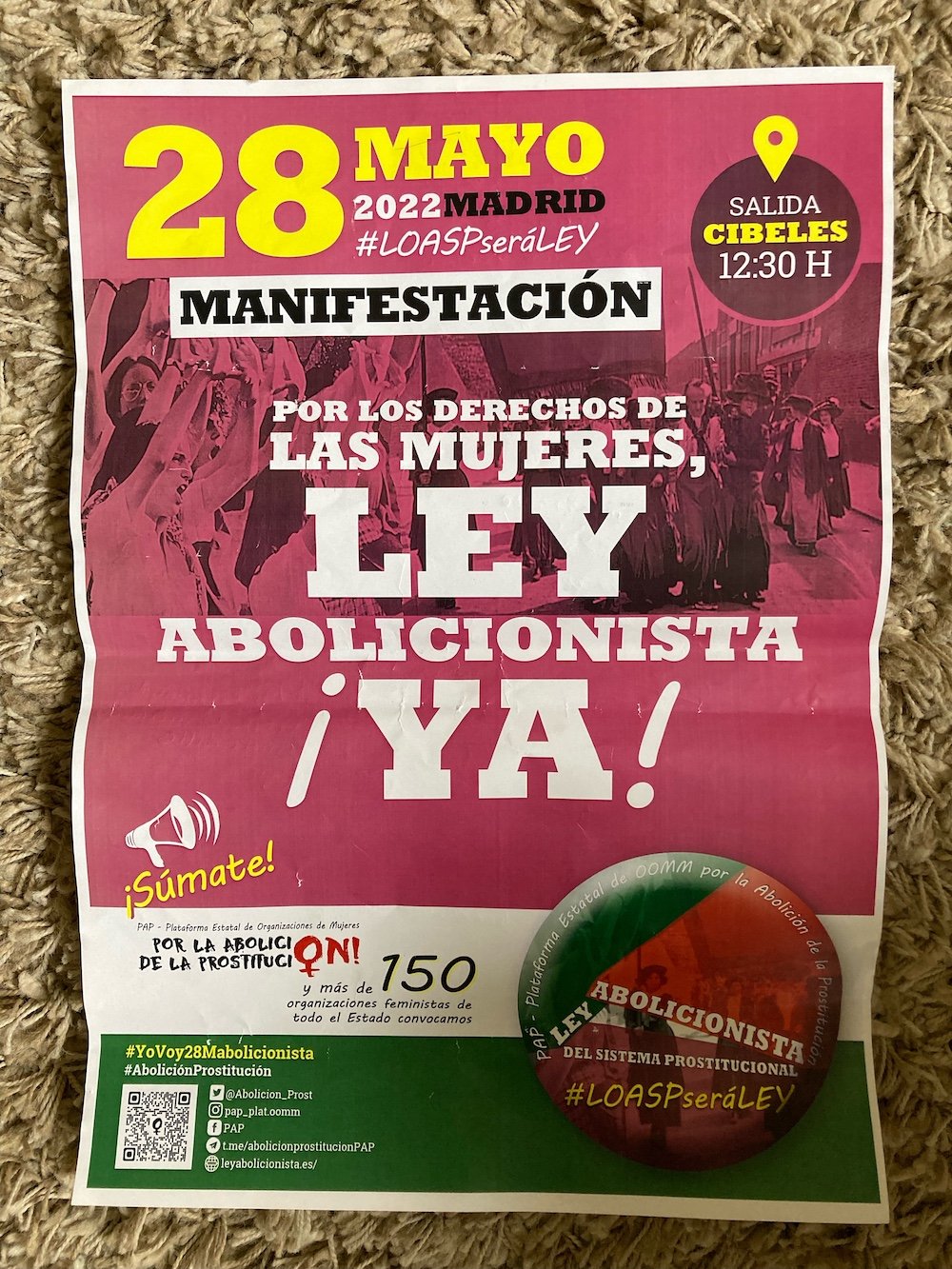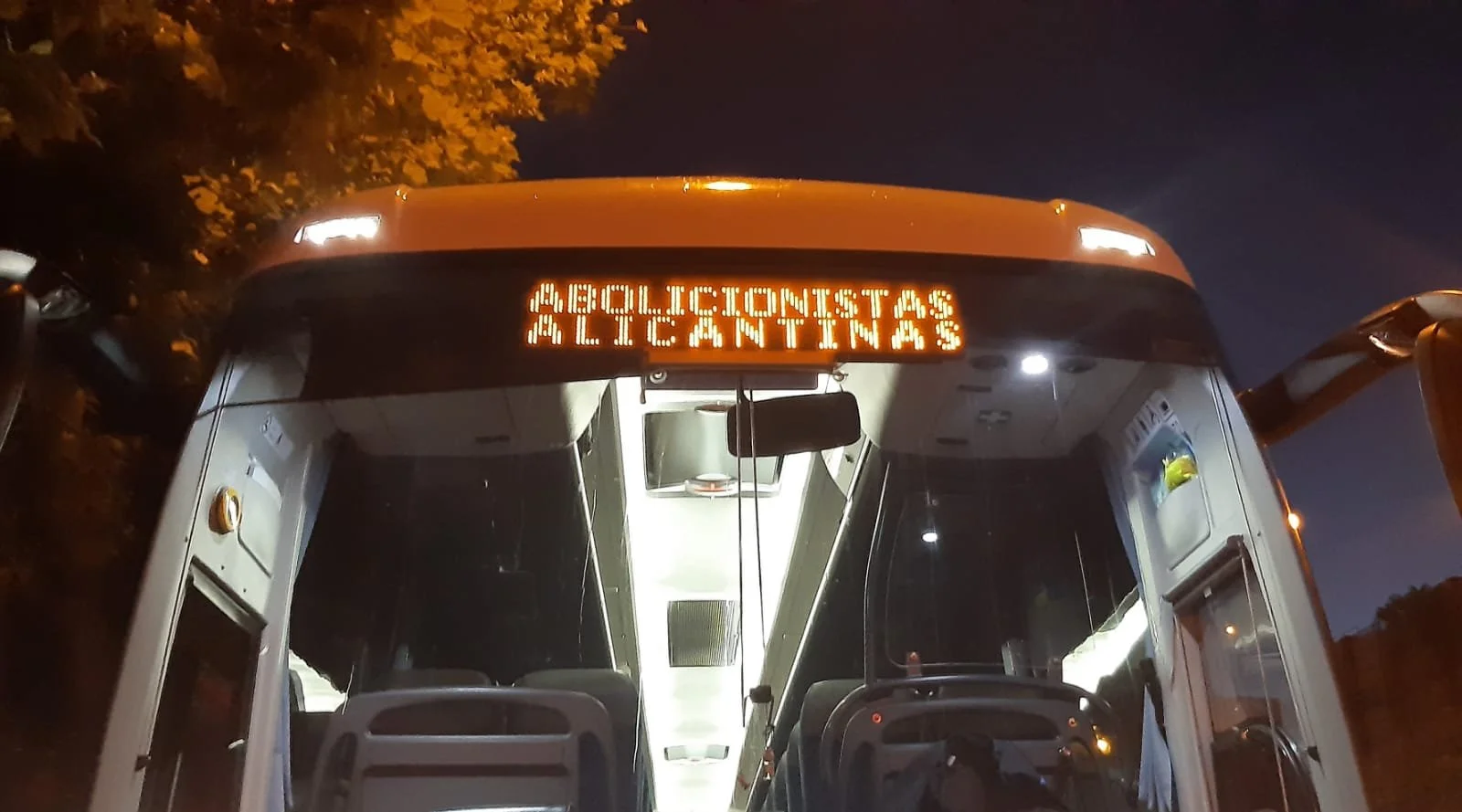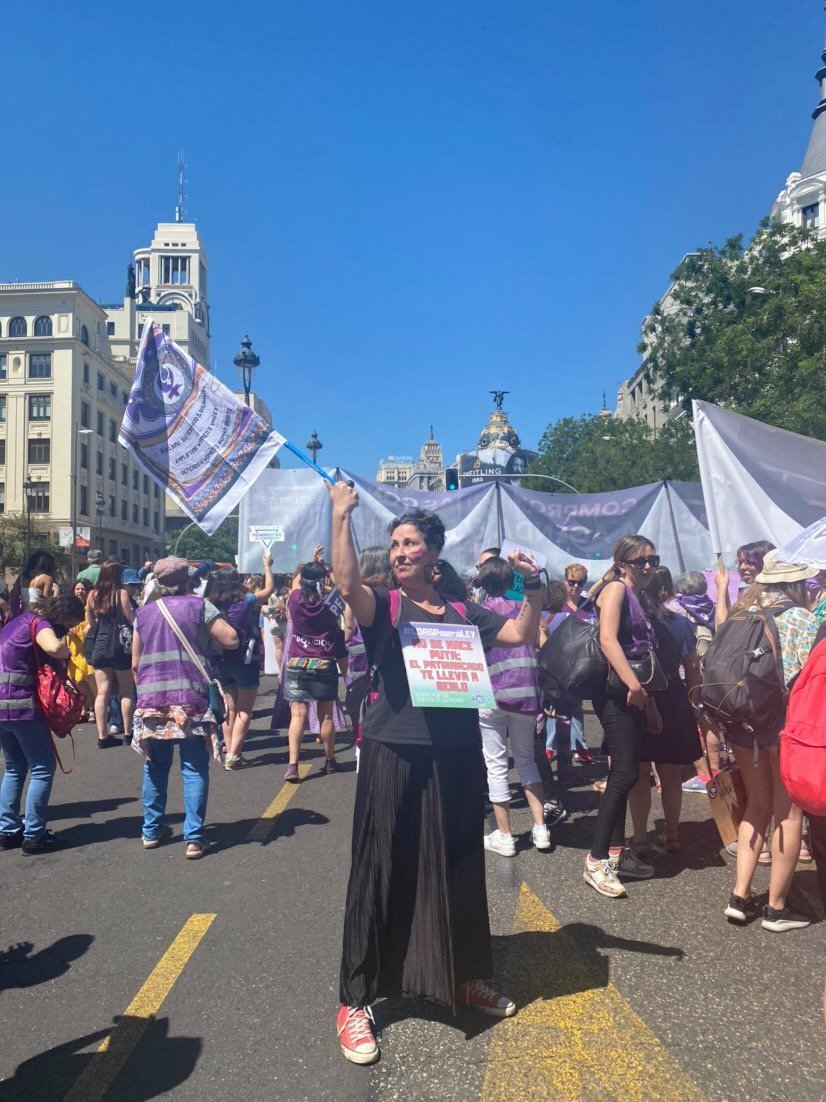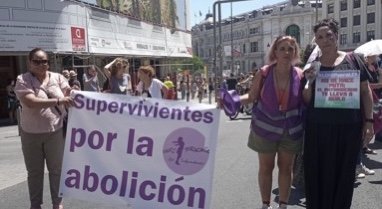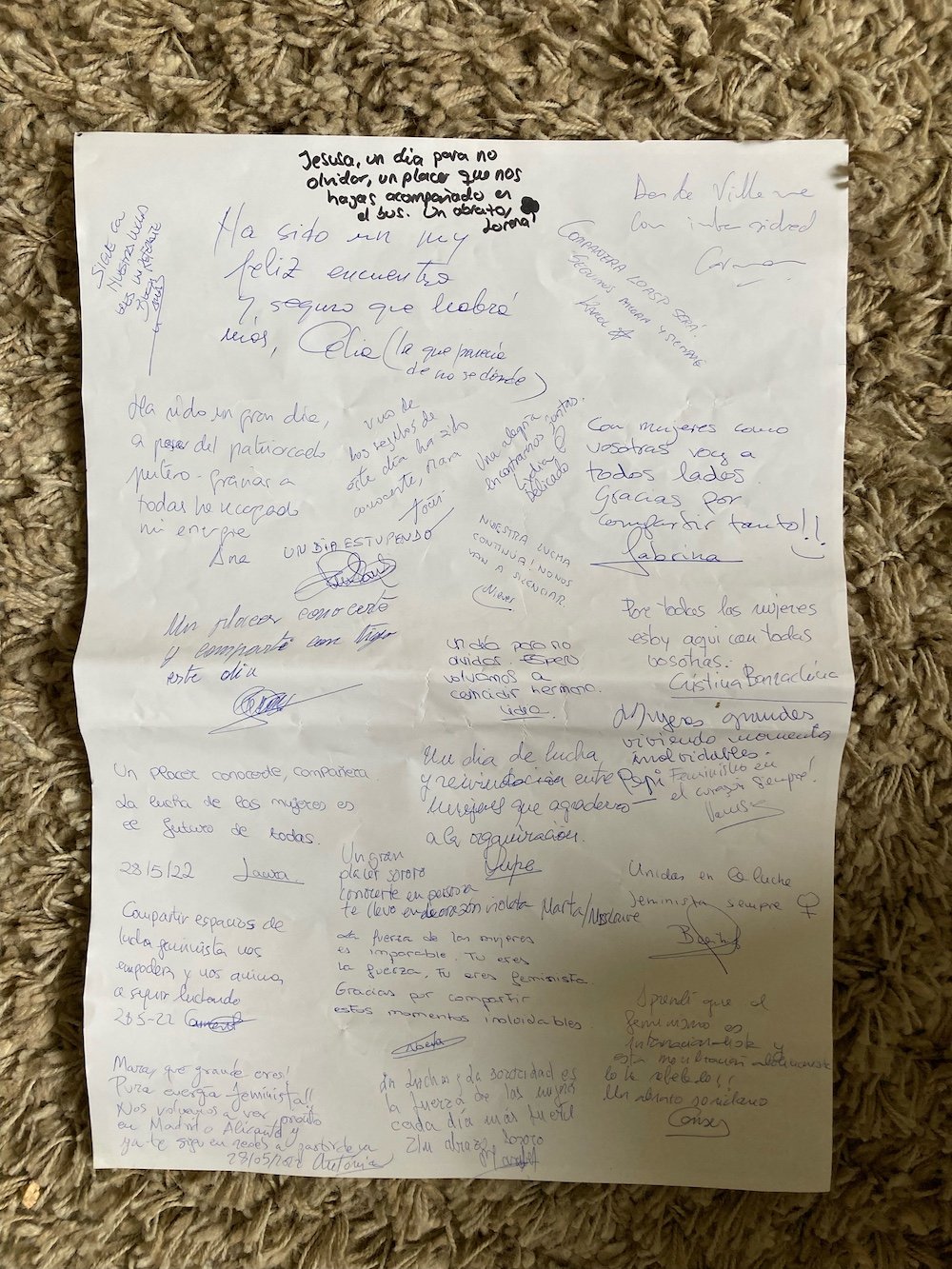I Only See Goddesses - A Chronicle of the Spanish National Demonstration for the Abolishment of Prostitution
By Matriactivista
“Arriving in Madrid and seeing all the feminist flags, the different logos and cities united by the suffragette palette of colours, was like seeing a lion waking up in a cage preparing to roar.”
In these days when even a term such as “identity” has been corrupted, I think of mine, which has always been somehow confusing. I was born in Alicante, Spain, but moved to London when I was 18 and, during lockdown, my family and I moved to Glasgow. As a feminist, I am made up of what I have learned from the many empowering women I have met in England, the warm and lovely support of my Scottish feminist sisters, and the strength of the Spanish women I know. I am a proud volunteer of FiLiA, which includes many women from around the world. But I remain totally connected to the problems of my sisters in Spain because culturally I am aware of them, they are part of who I am and I try to support them as best as I can. So when a national demonstration for the abolition of prostitution was being organised for the 28th of May, in Madrid, I felt I had to be there. And I would like to say that I am very grateful to FiLiA and Igualdad Raspeig especially but also to all my sisters for the support that made it possible for me to be there.
Poster advertising the demonstration
It was a last-minute trip and, just as my country and I tend to be, it was intense and emotional.
The demonstration was organised by Plataforma de Mujeres para la Abolición de la Prostitución (PAP) and supported by 175 feminist associations from all corners of Spain. Buses had been organised from the main cities to the centre of Spain, Cibeles Square in central Madrid and the plan was to walk to Plaza España through the Gran Via, the most popular avenue in the capital city. I took a flight to Alicante on Friday night and, through a rushed conversation with a woman on Twitter, I managed to get a space on the “feminist bus” as I called it. The bus was leaving Alicante on Saturday at 6 am. After little sleep and with it still being dark, I met with other women looking as sleepy and unsure as I was who were also waiting for the bus. I turned up with an improvised flag I had made with our fabulous tea towel by Emma Dolan and the stick of a fishing net.
Some timid “good mornings” were exchanged, and a lot of the women did a double-take when I said I had come from Glasgow. We were still talking quietly and just to those next to us at the beginning of our journey when I was given the opportunity to introduce myself with the microphone on the bus and many women recognized me from social media. At the only stop on our trip, at 8:30 am, I realised that one of the passengers was a woman I hadn't seen for 27 years, from a time when neither of us were feminists and she was friends with my older brother. We couldn’t believe it. It was only the start of a very emotional journey, but women’s journeys often are.
Getting to the demo
Catching up, of course, involves exchanging kids' pictures, reflecting on our lives' high and lows, but also disclosing our anger, sharing tears, and swearing against the patriarchy, bringing us to the reason we were sitting on that bus going to Madrid.
But the mood was picking up, and we were rehearsing some of the chants we will be singing; some more ironic than others, some more angry, all of them our collective truth which is hardly ever spoken enough.
Arriving in Madrid and seeing all the feminist flags, the different logos and cities united by the suffragette palette of colours, was like seeing a lion waking up in a cage getting ready to roar.
No longer sleepy, the energy was clear, with women from other parts of Spain greeting us on the way to the meeting point. As we were walking, someone offered to paint my face with purple makeup. Then Pepi, the amazing organiser of our group, distributed signs, placing one around my neck that read: “One is not born a whore, the patriarchy leads you to be one”.
Matriactivista waves FiLiA flag on demonstration
In the middle of the excitement, while waiting for all the buses to arrive before the start of the march, a very tangible and mundane realisation: it was very hot, too hot. Madrid was boiling at 34 degrees Celsius, and no shade throughout the entire march. The main roads that cross Madrid had been closed for us, the press was already there.
I was interviewed by one of the mainstream channels, the excitement of having our voices heard was palpable in all of us, the sorority and emotion too. The press asked me about the reasons we were there and I highlighted that this was something my sisters in Spain had been asking for, for years. That today was a reminder of the lack of action on the ‘LOASP’, an abolitionist law proposal created by a platform of feminists associations and women formed in 2002, on which they had been working since 2019. A law that we are hoping to see made a reality. I also told the journalist about the need to deconstruct the whole structure that sustains prostitution and the oppression of women. I asked when the interview would be aired. “Lunch-time news” they replied, which in Spain is at 3 o’clock.
Then came the hugs and surprises while waiting, as women I only knew virtually were appearing in front of me. Many of my admired sisters became finally real, our voices now together taking the streets. The only representation from the current government was Carmen Calvo, ex vice-president, who was there, I felt, more as a feminist than a politician, or at least that was my feeling when I saw her with the others. Carmen Calvo is from the PSOE, a leftist labour party that is currently ruling in coalition with Podemos a communist populist party which claims to be feminist, but having spoken to many women on the bus, is what they now consider to be the biggest disappointment and betrayal of feminism in Spain’s history. And that is why I felt that Carmen Calvo was there more as a woman and a feminist than in an official representation of her party. She has made it publicly known that she is opposed to the Self-ID laws and gender ideology that Podemos is trying to implement in Spain. However, when asked by the press she merely said that the PSOE is abolitionist.
As I walked through the march the slogans sounded loud and powerful despite the heat and tiredness, while I was getting more concerned for myself and my older sisters as I saw an ambulance coming through the demonstration. Small incidents of heat strokes were later reported but the collective voice persisted, with reminders of the need to expose the pimps and men who go to prostituted women. The most significant chant was “Putero pagando también estás violando” (John, even when you are paying you are raping) and the one that gave me the chills was “be careful you could have a putero (a John) beside you”. And that was how I felt looking at the confused expressions of all of those men on the pavement staring at us. How many of them are participants in this crime, how many of them euphemistically through jokes, comments and silences, are complicit in the suffering of women? How many of those men had engaged in sex by raping and paying, and how many of those passing beside us, family men, business men, young men, old men, believe that is normal, natural and positive, and that enslaving women for their pleasure and abuse is part of (their) life?
I had to take breaks as I was feeling unwell with the heat but I wanted to be there. I wanted to shout, I was angry, angry at the passers-by for not being as angry as me, angry at the young British guys who humoured us as they walked through our march. I was angry as I am every day at the world who knows of the exploitation of women and not only observes but participates and benefits from it. I was angry at the poor guy that hardly spoke Spanish and tried to sell us feminist cloths - ”A man selling us our merchandise”- I thought, what a perfect representation of the political state of affairs.
I was also angry at the ones that read the sign I was wearing and twisted their faces in disgust, because “puta” (whore) as a word in Spanish is just as used and abused as the women who are named with it. In Spanish to insult someone you say “hijo/a de puta” (son/daughter of a whore), something that feminists have now changed to “hijo de putero” (son of a John). When something is really good in Spanish you say “de puta madre” (of a mother whore).
Language to me, as a translator, is the expression of culture, and prostitution is part of Spain’s culture, trivialised, normalised, mocked and integrated. Not surprisingly, it is the European country with the largest numbers of men paying for abusing women, data from 2009 suggests that up to one in three Spanish men had paid for “sex”, and another that the figure may be as high as 39%. In 2011 a study from the United Nations cited Spain as the third biggest centre for prostitution in the world, behind Thailand and Puerto Rico.
Prostitution is currently unregulated in Spain and there are no sanctions as long as it does not take place in public spaces, which has led to a different type of pimp who is also a “landlord”. However, pimping or acting as a dealer between a prostituted woman and a potential client is illegal. The industry has boomed since its decriminalisation (1995) and it is commonly estimated that around 300,000 women are prostituted in Spain. This generates 5 million euros a day, and prostituted women are poor. Do the patriarchal math: one winner at the expense of a multitude of victims, and determined by the binary inescapable matter of sex. Nothing remotely logical, fair, or healthy in such an equation.
It is no coincidence that 28M marks the International Day of Action for Women’s Health. I was thinking of all of this when I encountered the smallest group of women within the march, just two of them with a banner that read “survivors for abolition”. Without realising it, I had found the heart of the demonstration. They were Kamilla Ferreira and Carol L. I introduced myself by shouting over the intense feminist drums and asked them “why are you here’”, and that is when the reality hit me more than the heat I was experiencing. This lovely and smiley woman with a strong Portuguese accent said: “I am Kamilla, I was trafficked taken from Brazil when I was 14 years of age”, then she lists all the countries where she was taken and exploited, Chile, México, Thailand… while I can barely follow her on that journey to hell, my stomach and heart seemed to have stopped at the thought of a 14 year old girl taken from her family to be raped for 30 years. I am staring at her speechless and all I can do is give her a hug. She then points at a woman behind me and says: “there is the one that who save me, the real hero”. The woman refuses any credit, she is Kamilla’s boss and colleague now. I ask her about their friendship and she talks with so much love and admiration, about Kamilla, she tells me how she is working but also studying thanato-aesthetics (applying makeup to make dead people more presentable) and she adds: “Kamilla says she prefers dead people now, as live ones have hurt her too much.” Still processing every word heard, I posed for a picture of the three of us.
I then spoke to Carol who I knew from social media. Later, having read her story in an article, I can't even begin to comprehend how much violence a woman can endure in one lifetime and still be standing, being there for others, fighting for our liberation. I did ask Carol about her opinion on the argument that we abolitionists have no right to speak on behalf of women who are prostituted. She says clearly that is nonsense, and concludes: “the feminist abolitionists are the only sisters we have in this fight”.
On the right me beside Carol L. and on the left Kamilla Ferreira
With a wink in sorority and the promise to be in touch, I carry on through all the women trying not to collapse with the heat while pursuing my mission to meet as many women as possible.
I feel the responsibility of amplifying their voices, which is at the heart of FiLiA’s work. I need my Spanish sisters to be heard by my British ones. I feel the urgency of internationalist feminism to shout collectively, and I want to tell all of the Spanish women about the work of FiLiA. We need all of our voices, we need all of our stories, we need women to be not only present in the world, but to be highlighted, listened to, elevated, healed, safe…14 years of age!! The echo of Kamilla’s words is now tightening my jaw when I shout every slogan, my own experiences of getting close to that abyss coming to mind, as a teenager attending fake interviews advertised for “young dancers, opportunities to be a model” and narrowly escaping by pure chance. My self-objectification normalised at 17 by dancing as a “go-go” in discotheques feeling like a goddess not knowing the vultures only saw me as meat. I was the daughter of someone who didn’t feel like a goddess and I think of my daughter, our daughters. I started to feel faint so had to take a moment in the shade while feeling guilt for not holding the banners but the lessons in sorority came fast and plenty. Someone put sun cream on me, they called me by my social media name Matri which was funny, and cared for me as if they really knew me, “you are burning, be careful”. Another one shared water. It felt like all the sisters I never had were there…
And they were.
We arrived at the finishing point and the manifestos were read by women representing the 175 supporting organisations, while the press took pictures. And we dissolved back into patriarchy, into the less powerful warriors that they make us believe we are. It was clear as I separated from the group that I had lost my power, and was faced by the huge crowds of men who were getting ready for their rituals around the Champions League Final. The herds of men mocking my colours, my flag, it was such a clear realisation of the reality and so sudden, and so familiar, I had to find shelter in a bar and eat something. I felt weak again, as if Superman fell on Krypton.
I searched for news on my mobile phone, for pictures, but there were hardly any coverage beyond the unavoidable documenting of reality. My interview and many others never made it to television, the time dedicated to our movement and action by the press was spectacularly negligible.
The news, depending on the paper, went from a demonstration of 3,000 people to 7,000 people (not women). I think the police and organisation suggested between 8,000 and 10,000. The news by 4 o’clock had moved extremely quickly to reporting the Champions League Final. The victory was already that of men in the streets of Madrid, which reminded me of the tweet by the National Centre for Domestic Violence that stated: “Not everyone is looking forward to the match tonight...
Instances of domestic abuse increase 26% when England play and 38% if they lose”.
And it also reminded me that the female team of Rayo Vallecano has a coach who was recorded encouraging other men to rape the girls in the team, but to be clever and wait till there are 18. And that despite many daily complaints he remains in his job.
Some might think that I shouldn't have a problem with footballers who are heroes in our society. Recently I was kindly invited to talk to children in my daughter’s school in Scotland about professions. Many boys told me they wanted to be footballers. But none of the children, boys or girls told me they wanted to grow up to be exploited.
I choose my heroes carefully and although I don’t like football I like a Spanish footballer called Paula Dapena who refused to stand and pay tribute to Maradona, who was, as photographic evidence shows, a paedophile and abuser of women, including those who are prostituted.
I would like more children to inspired by women like Paula and less by Maradona. But another topic in our slogans was that porn is not an education. And although as we chanted that nobody is born to be a whore, some are groomed into becoming one and some to become the ones who rapes them.
No girl is born to be a whore, we shouted that at the top of our lungs but our lungs seem like those of a little bird in the middle of a burning forest.
I admit at that point while eating, I felt slightly defeated and then I thought, all of this happens with us holding patriarchy accountable for its crimes, I don’t even want to think what would it be like without feminism. That realisation was clear. And became even more relevant when I took that opportunity to read an interview with Kamilla Ferreira where she explained how deliberate was the segregation of women in prostitution, and how while they were trafficked they were prevented from learning each other's languages. I've thought of course that is our power, our sisterhood and our voices.
Our networks are more than connections. They are prevention, care, opportunity, safety and health, they have always been and we should never underestimate them. There lies our strength, that is our roar in the cage. That is the light that never fades. That is the power of all of us, and ourselves.
We all finally made our way in small groups, telling our stories of coping with the heat. We boarded the buses to return at 5 in the afternoon after some lunch, and were united in our exhaustion, physical and emotional. But with a sense of strength in our sorority and common objective.
On our way home I felt we knew better who we are and why we need each other. I spoke more calmly to all the women in the bus and discovered that they were women of all ages, many with long trajectories in local feminism in the Alicante province. Within the institutions, as academics, as mothers, as leaders of younger generations, caring for exploited women, going to every gathering they can. I asked them to sign the poster of the demonstration, so I could take them with me somehow. I went back to my seat and started crying, because suddenly it hit me, they are from my city, many of those women were there before I was even born, and others like them, and I couldn’t help but to imagine how different my life would have been if me or my mother had met any of them before. I was glad for the many girls and women that will be somehow affected by meeting any of them, “mis compañeras”.
Because the world, just like me, is better thanks to feminism, but being born a woman in a patriarchal order is still an act of endurance and survival. And we will not stop until all women everywhere are free and born free.
Signatures on the reverse of the demo poster
I am trying to write all this during a cool Monday morning while back in Glasgow and before any details of what matters evaporate, when a small but poetic detail makes its way to my mind. The demonstration started at the most famous fountain in Spain, Cibeles, which is named after the goddess Cybele, which was mainly associated with fertility, but also known for her wild strength and for being a healer and a protector of her people during a war.
Cibeles Fountain - Naknaknak, CC0, via Wikimedia Commons
I went to Madrid feeling as if I was crossing some kind of feminist borders, trying to connect countries. Now I feel that my identity as a woman and a feminist is as clear as it has always been. I’m a woman in a patriarchal world. I will defend my sisters everywhere from the injustices we suffer individually and collectively. Feminism is universal and atemporal just like our struggles. And after the day in Madrid I would say that we are more connected that we have ever been in our feminist history.
As I finish writing this text, news from Spain arrives announcing that the Conservative party will support PSOE during the voting of the abolitionist law, and the papers seem to have recovered many pictures from the demonstration to talk about how by 2023 we could be seeing the punishment of pimps and any men paying prostituted women and those renting clubs and flats for those purposes.
I cry again…
I only see goddesses.

